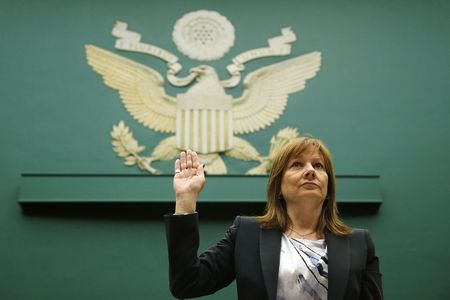By Jessica Dye and Julia Edwards
(Reuters) - General Motors Co may end up compensating many more people than the families of 13 victims it has linked to a faulty ignition switch, as it considers waiving key legal defences in order to resolve injury and death cases out of court.
Details of the compensation program, while still not final, began to emerge during congressional testimony by GM Chief Executive Officer Mary Barra on Wednesday and in subsequent interviews with plaintiffs' lawyers.
Barra said the program, expected to be announced by July, will not reject claims based on a previous settlement with GM or the company's bankruptcy status at the time of the accident.
Plaintiffs' lawyers said they also believe driver negligence would not be an obstacle to claims.
On Wednesday, U.S. Representative Diana DeGette of Colorado suggested during the hearing there could be as many as 100 deaths linked to the faulty switch, which has prompted a recall of 2.6 million vehicles since February. GM has so far acknowledged 13 fatalities in connection with the defect.
A spokesman for DeGette said her estimate comes from private interviews with GM employees and other individuals close to the matter, conversations with investigators from the National Highway Traffic Safety Administration and access to GM documents given to her staff and the House committee.
Plaintiffs' lawyers say that besides fatalities, there may be many more victims with serious injuries who could also bring claims.
Barra told Congress the compensation program, to be managed by lawyer Kenneth Feinberg, would begin accepting claims by Aug. 1. She said the program was intended to compensate "every single person who suffered serious physical injury or lost a loved one" as a result of the switch, and Feinberg would have "full authority" to determine how much each claimant was paid.Â
Feinberg has been discussing possible eligibility criteria for the program with lawyers representing crash victims and their families.
One of those lawyers, Robert Hilliard, said Thursday that victims would not be required to waive their right to sue GM unless they accepted a payment and signed a release through the compensation program.
A spokesman for GM, Jim Cain, said that Feinberg would determine the protocol for accepting and administering claims.
The preliminary details that have emerged about the compensation program would require GM to waive several defences it could have used if claims were brought in court. One of those defences would be the terms of GM's exit from bankruptcy in July 2009, which shield the company from liability for accidents prior to that date.

An attorney representing some crash victims, Lance Cooper, said that victims or their families who choose not to participate in the program would face the daunting prospect of going up against GM in court.
"It's taking on GM with all the defences GM can assert," Cooper said. "For many people, that may be a very difficult road to travel."
(Reporting by Jessica Dye in New York and Julia Edwards in Washington; Editing by Ted Botha and Lisa Shumaker)
